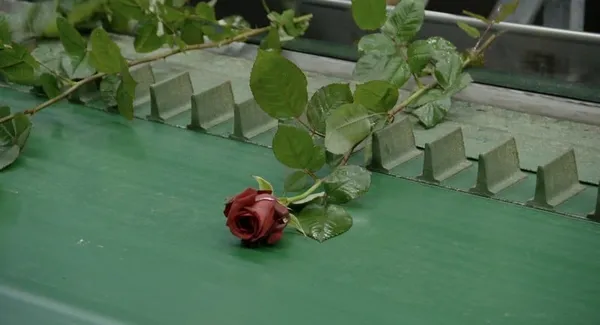Eye For Film >> Movies >> A Flower In The Mouth (2022) Film Review
A Flower In The Mouth
Reviewed by: Anne-Katrin Titze

Éric Baudelaire’s distinctive A Flower In The Mouth (Une Fleur à La bouche), co-written with Anne-Louise Trividic, shot exquisitely by Claire Mathon (Pablo Larraín’s Spencer, Céline Sciamma’s Portrait Of A Lady On Fire and Petite Maman, Maïwenn’s My King), stars recording artist Oxmo Puccino making his impressive acting debut, and Dali Benssalah (Rebecca Zlotowski and Sabri Louatah’s Savages with Roschdy Zem and Marina Foïs, Cary Joji Fukunaga’s No Time To Die, Louis Garrel’s A Faithful Man). The 67-minute film, produced by Sylvie Pialat and Baudelaire, had its world premiere screening this past weekend in the Forum section of the 72nd Berlin Film Festival and is bisected into two filmic hemispheres, both dealing with flowers in existential ways.
A woman is carefully, beautifully gift-wrapping a package in a small shop. It is already dark outside, autumn maybe, and a man (Oxmo Puccino) in a black overcoat, carrying a tall closed umbrella, looks at her through the window. Reflections of cars flicker and blur what is inside and outside. The sounds of a Paris ambulance are heard in the distance. He slowly walks away, the street is empty. And off jumps the film into becoming a hybrid documentary, showing the machinations of a gigantic Dutch flower market.

“Enjoy life, love Lillies,” we read on some packaging - a command hard to do in this factory environment. The flowers might as well be car parts, as nothing here is reminiscent of nature anymore. Wrapped Veronicas dangle from a wagon, are checked and moved on; big bunches of Marguerites are transported on trolleys whose workers wear orange vests and can only stand up while driving. Orchids are being scanned for wholesale and Roses arrive from Kenya. Flowers travel far and wide before landing in our homes, a fact that most like to forget. The majority of the workers here are women who look as if they had been there for decades and knew exactly what to do in this repetitive job.
Flowers and machines and humans. We see the machines. An incomprehensible flower auction takes place on computers: we hear “White Liberty,” and “Pink Montezuma,” and “Golems,” and “Heldermann.” You could make up a tale with these names, were the atmosphere not so sterile and industrial and joyless. In the next section, machines do the sorting. Without humans in sight, the place looks otherworldly. Baudelaire made the great choice to forgo any kind of music here, with only the clinking and banging of the trolleys providing a tired rhythm. Empty at night, the place resembles an underground parking garage, and the images conjured up in your head by the words “flower” and “market,” sadly have nothing in common with the warehouse reality.
A Flower In The Mouth is based on Luigi Pirandello’s play from 1922. We return to Paris and the flaneur encountered at the very start. On his evening walk he (Puccino) stops at a store that sells shoes for 20 Euros and cheap men’s suits, as the owners close shop near Place de Roubaix. The man eats a sandwich and looks on, before he enters a bar near a train station to have “the usual.” A younger man (Dali Benssalah), clearly not a regular and from the provinces, comes in with his many shopping bags and orders a blue cocktail. The two strangers start to talk. It is the “hour of the mandolin,” and were it not for the question “do you ever give flowers?” to remind us, the other part of the movie seems lightyears away. And yet it isn’t. The flower of the title eventually reveals its meaning.
“What would make you happy?” asks the man who missed his train to Nancy. He receives the answer “Another life, another ailment.” The men talk of waiting rooms and the thirst for life, memory, absurdity, and what flavour a situation will have when remembered four years from now (Karen Blixen always started a new work of fiction with a flavour). Transposed from the Twenties of the last century into our present one (with references to New Orleans right before Katrina hits, for instance), the discussion about imagination, observation, and what it means to be alive is deadly relevant. The two men when they meet are as far away from each other’s experience as can be. The small daily problems and the one large and looming make up life.
Dreams and wishes can be powerful instruments, when put to the right use. “If I don’t keep busy, I could maybe take the life of a random person, like you perhaps, who missed a train,” says the man. Is it a joke? Or maybe talking to strangers isn’t such a good idea after all? Une fleur à La bouche is a flinty film that never caters to easy imagery. There is no narrative Möbius strip connecting the dots for us. It is as though we are taunted to imagine another kind of flower market, a beautiful and fair and local one, that exploits neither workers nor nature.
Reviewed on: 15 Feb 2022
















